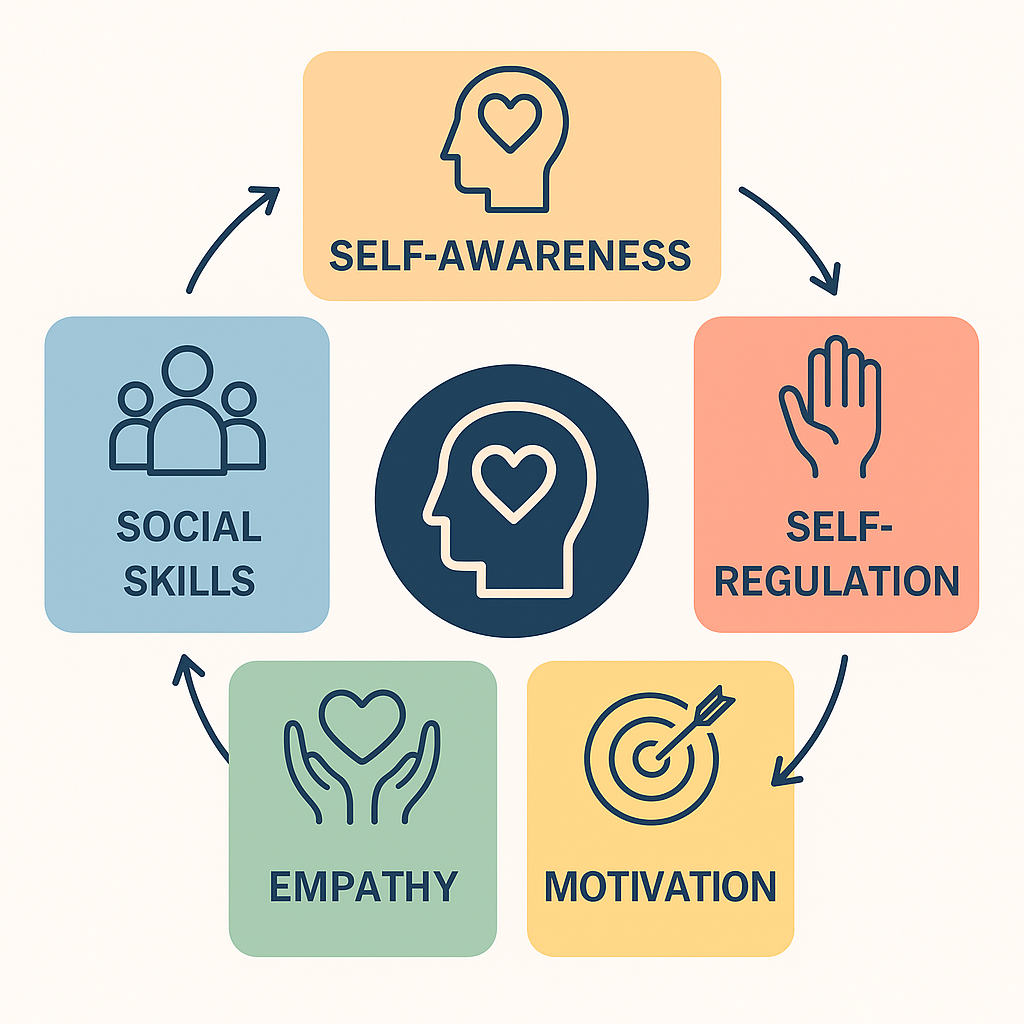Emotional intelligence is the ability to understand and manage your own emotions, as well as recognize and respond to the emotions of others. It’s not just about being “nice” or “sensitive”—it’s about being smart with your feelings and using them to handle life and relationships in healthy ways. People with strong emotional intelligence can stay calm under pressure, communicate more clearly, and work well with others. This skill is useful in every part of life—at work, at home, in school, and in friendships.

The five parts of emotional intelligence
Emotional intelligence is often broken down into five main areas: self-awareness, self-regulation, motivation, empathy, and social skills.
Self-awareness means knowing what you’re feeling and why. When you’re self-aware, you can name your emotions as they happen. You might say, “I’m feeling stressed because I have too many deadlines,” instead of just feeling overwhelmed with no clear reason. Being aware of your emotions is the first step in learning how to manage them.
Self-regulation is your ability to manage your emotions instead of letting them control you. It doesn’t mean ignoring your feelings—it means handling them in a way that’s healthy and thoughtful. For example, someone with strong self-regulation might take a walk when they feel angry, instead of yelling or saying something they’ll regret.
Motivation is the inner drive to improve yourself and keep going, even when things are hard. People with emotional intelligence are often motivated by personal growth, not just by rewards or approval from others. They bounce back from setbacks more easily because they have a deeper reason to keep trying.
Empathy is the ability to understand what someone else is feeling. It’s about seeing things from another person’s point of view. Empathy doesn’t always mean agreeing, but it does mean caring about how others feel. This helps build trust and connection in relationships.
Social skills include communication, listening, teamwork, and conflict resolution. People with strong emotional intelligence know how to have difficult conversations, support others, and work through disagreements without causing harm.
Why emotional intelligence matters?
Emotional intelligence affects how we handle stress, how we relate to others, and how well we do in many areas of life. Studies have shown that people with high emotional intelligence often do better at work, have stronger relationships, and experience better mental health.
Unlike IQ (which measures raw thinking ability), emotional intelligence is something you can improve with practice. You don’t have to be born with it. The more you reflect on your emotions and learn from your interactions with others, the more emotionally intelligent you can become.
In the workplace, emotional intelligence helps people work as a team, handle feedback, and lead with compassion. In relationships, it builds trust and prevents misunderstandings. For personal well-being, it helps you stay grounded and bounce back from setbacks.
How to build emotional intelligence?
The first step is to slow down and notice your emotions. Before reacting, ask yourself: What am I feeling right now? What triggered this feeling? What do I need?
Next, practice expressing your emotions in a healthy way. This might mean writing them down, talking to someone you trust, or choosing to pause before responding. Listening to others with empathy also builds your emotional intelligence—try to understand how they feel without jumping to fix or judge.
It also helps to reflect after social interactions. What went well? What could I have handled better? With time, this kind of awareness helps you respond more thoughtfully in the future.
Conclusion
Emotional intelligence is a powerful skill that can change the way you live and connect with others. It helps you stay calm, handle stress, and build better relationships. It’s not about hiding emotions or always being happy—it’s about understanding yourself and others, and using that understanding in wise, kind, and respectful ways. By building emotional intelligence, you’re investing in every part of your life—from your work to your friendships to your own sense of peace.
